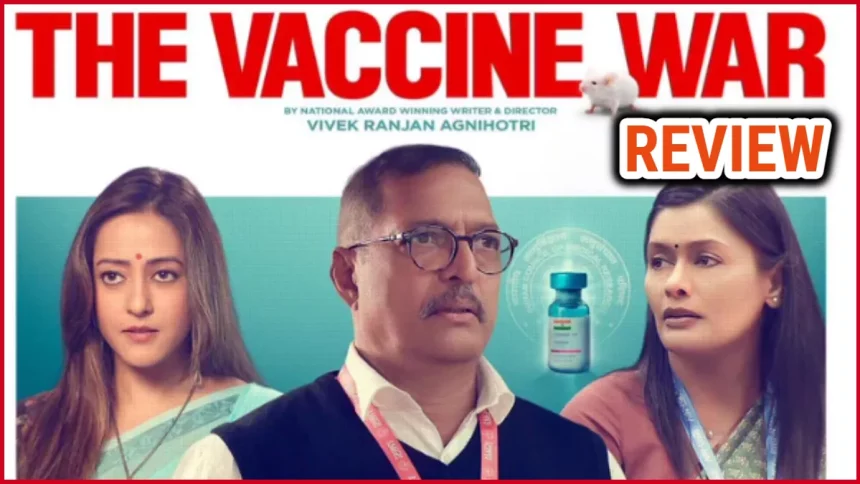The Vaccine War Review: Coronavirus, which emerged from China’s Wuhan lab, causing havoc all over the world. Many heartbreaking scenes came to light during the second wave of the Corona epidemic. At that time everyone needed a vaccine, but making a vaccine is not a game. It takes years to make a vaccine. Under these circumstances, India decided to make its own vaccine. But Directed by Vivek Ranjan Agnihotri, The Vaccine War depicts the tireless efforts of frontline workers and scientists who worked day and night to create India’s indigenous vaccine. But the film especially narrates women scientists’ struggles, and ultimate success. Who believed India could also make its own vaccine and not depend on foreign organizations!
The book Going Viral of The Vaccine War
 Making of Covaxin, written by Balram, Director General of the Indian Council of Medical Research (ICMR), tells the story of self-reliant India. This film is based on this book. There are 12 chapters in the movie. The film begins on January 1, 2020, when news of a virus causing pneumonia-like symptoms hits the headlines. Divided into 12 chapters, the film takes each challenge one by one and how the team of scientists manages to overcome them and emerge victorious.
Making of Covaxin, written by Balram, Director General of the Indian Council of Medical Research (ICMR), tells the story of self-reliant India. This film is based on this book. There are 12 chapters in the movie. The film begins on January 1, 2020, when news of a virus causing pneumonia-like symptoms hits the headlines. Divided into 12 chapters, the film takes each challenge one by one and how the team of scientists manages to overcome them and emerge victorious.
After depicting the pain of Kashmiri Pandits in ‘The Kashmir Files’, Vivek Agnihotri has made The Vaccine War as a medical thriller. Although The part before the intermission shows the lives of scientists.
Despite all the difficulties, Balram Bhargava, who is tough and dedicated to his work, instead of listening to the problem, believes in its solution. The film depicts the step-by-step manufacturing of Covaxin, which is being developed by Bharat Biotech at ICMR and the National Institute of Virology (NIV). During this period, Vivek touches on the frustrations, excitement, and domestic problems of the scientists inside the laboratories. Some moments even make you emotional. However, Vivek has taken a lot of time to establish the first part of the film. But This two-hour 40-minute film could have been shortened with tight editing. The film does not adequately depict the human tragedy caused by the Corona epidemic.
- Advertisement -
The pace slowed down after the interval
The story loses its grip after the intermission. The film revolves around the media trial. In the film, the media has been described as a puppet of ‘foreign powers’. Vivek’s effort to expose the toolkit sent to media houses for foreign vaccine promotion and existing pharma lobbying seems one-sided. The media as a whole will never believe that ‘India can’t do this’. Watching the film, it seems that the entire media has made it their goal to undermine the vaccine and the scientists dedicated to making it. In the film, it has been said about the media that it only spreads misinformation. This is indigestion.
 The film closely depicts the experiments on rats and monkeys in laboratories. However, no attempt has been made to create any curiosity regarding the research. Nana Patekar as Dr. Balram Bhargava (DG-ICMR) suits his role. The vision of making the vaccine and his dedication to it inspires respect for Bhargava. Pallavi Joshi’s performance in the role of Director-NIV Dr. Priya Abraham is commendable. Girija Oak and Nivedita Bhattacharya leave their mark on their respective characters. The character of journalist Rohini Singh Dhulia has not been crafted properly though.
The film closely depicts the experiments on rats and monkeys in laboratories. However, no attempt has been made to create any curiosity regarding the research. Nana Patekar as Dr. Balram Bhargava (DG-ICMR) suits his role. The vision of making the vaccine and his dedication to it inspires respect for Bhargava. Pallavi Joshi’s performance in the role of Director-NIV Dr. Priya Abraham is commendable. Girija Oak and Nivedita Bhattacharya leave their mark on their respective characters. The character of journalist Rohini Singh Dhulia has not been crafted properly though.
In ‘The Vaccine War,’ we get a close look at India’s fight against COVID-19. It shows how hardworking scientists made a homegrown vaccine. The film also raises questions about the media’s role. Overall, it’s a thought-provoking movie that makes us think about the pandemic’s challenges and victories.


